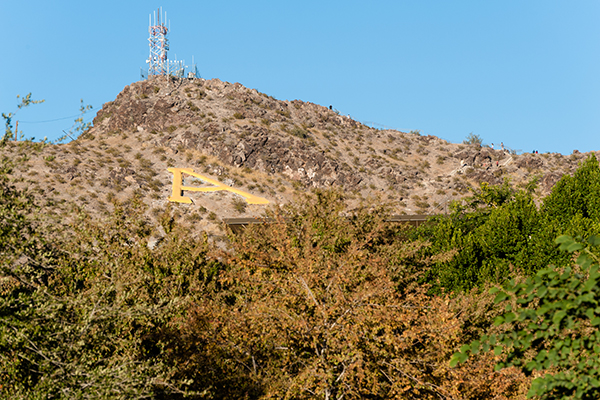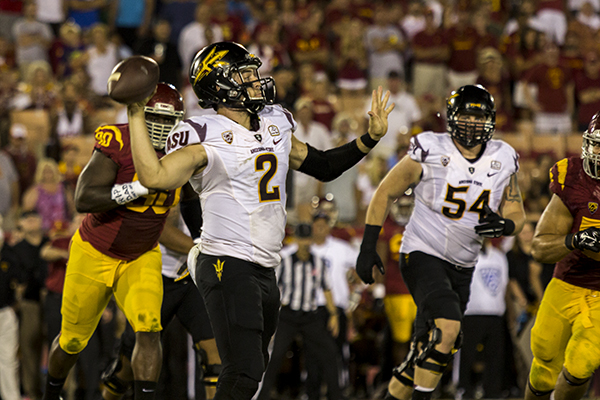As you endure your first full week of classes, read up on some of ASU's best and oldest traditions.
Whitewashing "A" Mountain
There has been a letter on Tempe Butte since 1918, but the first one was not an "A." According to the ASU Alumni Association, the first letter on Tempe Butte was "N," installed by the Tempe Normal School class of 1918. The letter was replaced with a "T" in 1925 and eventually changed to an "A" in 1938.
The "A" we see today was actually built in 1955 after vandals allegedly demolished the letter with dynamite.
When whitewashing "A" Mountain began in the 1930s, freshmen would hike "A" Mountain as part of their orientation. Today, each freshman class is encouraged to take part in whitewashing the "A" during welcome week.
SEE MORE: 'A' Mountain vandalism, hiking damages ancient petroglyphs
SEE MORE: Students react to ASU fans painting Wildcat sculpture
Watching the Homecoming parade

Photo by Scott Stuk | The State Press
The Homecoming FestDevil is when students, alumni and the community gather to celebrate ASU's unique life and culture. The Homecoming Parade is held in downtown Tempe and attracts large crowds. Hundreds of student organizations and community businesses showcase their floats at the parade.
SEE MORE: ASU Homecoming unites Sun Devils through tradition
Attending Lantern Walk
Photo by Ben Moffat | The State Press
Lantern Walk is a nearly 98-year-old tradition, according to the ASU Alumni Association. On the Friday before homecoming, faculty, students and alumni climb "A" Mountain together while carrying lanterns. When they reach the top, their lanterns collectively illuminate the mountainside.
Wearing gold everywhere

Photo by Alexis Macklin | The State Press
Gold has been the prominent color for ASU since the university was established. According to the ASU Alumni Association, the color was chosen, "for the golden promise, treasure and sunshine offered by the then Arizona Territory." Maroon and white were added to ASU football's color scheme in 1898. ASU faculty and students are encouraged to wear gold on Fridays to express their school spirit and gold is the default color for football games. On Monday's, look out for students and faculty sporting maroon.
A few old and new game day traditions to know about for football season...
Attending Camp Tontozona

Photo by Ben Moffat | The State Press
Known to most as "Camp T," Camp Tontozona is a pre-season bonding and team-building tradition started by former ASU football head coach Frank Kush in fall 1960. Camp T provides players with a unique practice environment and helps players focus on the upcoming season. The tradition of traveling and practicing at Camp T continued until 2008 when weather-related issues prevented the Sun Devils from practicing there. ASU football head coach Todd Graham brought the tradition back when he was hired in 2012.
SEE MORE: Football announces return to Camp Tontozona
SEE MORE: ASU football holds annual Camp Tontozona scrimmage amongst record crowds
Greeting ASU football at Devil Walk and watching Sparky stomp the bus

Photo by Alexis Macklin | The State Press
Devil Walk is a new tradition. If you come two hours before any home football game, you can go near the back of Well's Fargo Arena and hype ASU Football as they enter the stadium, according to Sun Devil Athletics.
Before kickoff, fans watch a video of a giant Sparky summoned in the Arizona desert by a solar flare. Giant Sparky raises his pitchfork and casts a haboob as he treks to Sun Devil Stadium, destroying houses, properties and vehicles.. Before entering the stadium, Sparky's right foot stomps the visiting team's bus. This new tradition never fails to hype the crowd and prepare it for a Sun Devil victory.
Shaking keys before kickoff

Photo by Alexis Macklin | The State Press
It has been a tradition that before kickoff, you and your fellow Devils jingle and rattle your keys. According to the ASU Alumni Association, the keys represent the next "drive" of the game. Just make sure those keys go back into your pocket after kickoff.
Chanting after first downs

Photo by Andrew Ybanez | The State Press
Here's another thing to pay attention to: downs. When the Devils convert on downs and earn a "first down" Wield your pitchfork and point it to the end zone. Really easy to do and the synchronization is neat to see.
Singing along to the Fight Song

Photo by Lilian Reid | The State Press
ASU's fight song is titled "Maroon and Gold" and was authored in 1948 by former Sun Devil Marching Band director Felix McKernan. The Sun Devil Marching Band performs "Maroon and Gold" at every football game and other school events.
Celebrating touchdowns with pushups

Photo by Alexis Macklin | The State Press
After the Sun Devils score a touchdown, the marching band plays the fight song and Sparky is hoisted a wooden push-up board. Carried by four Devils, Sparky hypes the crowd and does one push up for each point scored by ASU. That's one way to keep in shape!
Forking the end zone and celebrating victory

Photo by Aaron Lavinsky | The State Press
After a victory, the football team plants Sparky's pitchfork in the end zone and gathers near the student section to celebrate by singing to the fight song with students.
What is your favorite ASU tradition? Tell us in the comments.
Reach the reporter at anicla@asu.edu or follow @AndrewNiclaASU on Twitter
Like The State Press on Facebook and follow @statepress on Twitter.




